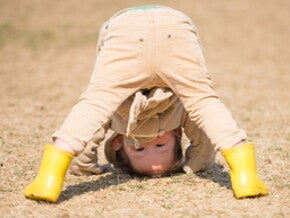
Tips On How To Teach Children Good Behavior
How To Raise A Well-Behaved Child
IMPORTANT NOTICE: The World Health Organization (WHO) recommends exclusive breastfeeding for the first 6 months and continued breastfeeding for as long as possible. Growing up milks are formulated to meet nutrition needs of healthy young children older than 1 year and should not be fed to infants.
Children between 1 and 3 years of age, usually recognize and understand the language basics, yet they don’t have the full capacity to use these basics to communicate with others in an effective way, and that’s what may cause them stress and depression.
Children of this age group are curious. They can move and stroll around. They have the will and determination to make things the way they want.
To teach your child discipline and good behaviors and get him used to the healthy manners that will help him live in peace with himself and people around, we advise you to follow on these tips and directions:
- Encourage your toddler’s positive behavior and give him lots of love and affection in return.
- Reward your child every time he makes a good behavior, in other words, appreciate your child’s rightful behaviors and pay a special attention to everything he does.
- Be your child’s role model. Act and talk in front of him the way you want him to, so your behaviors will reflect him and affect his own behaviors on the long run.
- Be kind and firm at the same time.
- Remove from your kid’s path anything that can get him to misbehave, like breakable stuffs and decorative accessories. Preventing a mistake is a lot easier than fixing that mistake!
- Ignore some of your toddler’s faults or annoying behaviors, because big mistakes are deemed worthier of corrections, especially if they are harmful and dangerous.
- Be a person of principles and always react to misbehaviors the same way, so your child will know he can’t get through it without punishment.
- Don’t talk to your child or try to correct his misbehavior right away and while you’re still mad at him, rather wait for few minutes to calm down and regain control over your words and acts.
- Use the time-out method to punish your toddler. This method of discipline requires isolating your child in a chair, far away from toys, and not talking to him until the time-out limit has gone by, i.e. between 1 and 3 minutes depending on your child’s age (1 minute for every year).
- Always talk negatively about your child’s behavior not his person.
- Do not complain a lot about your toddler’s negative behaviors, as children this age do not pay attention to complaints.
- Don’t attempt to use logic to convince your kid, for children this age won’t be able to understand it.
- Do not criticize your child and do not give him bad names.
- Do not reproach your kid and do not shout in his face, such behaviors may worry him and incite him to ignore you. Not to mention that yelling can make children behaviors even worse.
- Do not hit your child or slap him, so he won’t learn violence or understand that hitting is the right way to solve issues.
- Do not shake your toddler and do not pull him by his arm or hair.
Those were the basic steps towards disciplining kids between 1 and 3 years of age and teaching them good behaviors, use them with your child and you will be able to see the result on the long run: A fine good person with admirable behaviors!
Read More: Potty Training 101




















